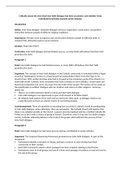contributed practically towards social cohesion.
Introduction
Define: Inter-faith dialogue- Interfaith dialogue refers to cooperative, constructive, and positive
interaction between people of different religious traditions.
Importance: Perhaps more acceptance and conversation between people of different faiths is
needed if this ultimately leads to social cohesion.
Scholars: Pope John Paul II
Conclusion: Inter-faith dialogue has had limited success, as many faiths still believe that their faith
promotes the truth.
Paragraph 1
Point: Inter-faith dialogue has had limited success, as many faiths still believe that their faith
promotes the truth.
Argument: The concept of inter-faith dialogue in the Catholic community is contained within a Papal
encyclical. Redemptoris mission is a Papal encyclical (authoritative letters from the Pope to his
Church) from 1990, written by Pope John Paul II, focused on the missionary work of the Church in a
multi-faith world. Catholics must remember they have a mission to non-Catholics, remain open and
honest and respectful, but never shy away from the truth of the Gospel. The section set for study on
the specification is entitled ‘Dialogue with our brothers and sisters of other religions.’ Some key
points are:
There is no conflict between belief in Christ and inter-faith dialogue.
Inter-faith dialogue is an opportunity to give a full account of Christian belief.
All religions hold aspects of the truth and are led by the Holy Spirit, so dialogue needs to be
respectful (and not have an ulterior motive of converting people).
Counterargument: There are question surrounding how successful a catholic would be participating
in inter-faith dialogue, when ultimately, they are exclusivists. The Catholic Church still teaches that
there is no salvation outside of the Church- a person must be baptised and live a faithful Catholic life
if they are to be in with a chance of going to heaven. Therefore, even if a key aim is to build a happy
society, Catholics ultimately believe in the truth of the gospel which will limit the success of their
inter-faith dialogue.
Paragraph 2
Point: Inter-faith dialogue has had some success and has contributed to social cohesion.
Argument: The Scriptural Reasoning Movement promotes true inter-faith dialogue. As part of this
movement:
Participants identify a narrative or theme, perhaps a concern or issue arising from their
community or their context.
Each faith community selects a short passage from their scripture relating to that theme.
Participants meet in small groups and one at a time, each passage of scripture is read out loud to
the rest of the group.
, Convened by a facilitator, participants then discuss the passages one at a time- they may begin
by asking questions to help them understand it better, or share a reflection or something that
particularly strikes them as they hear it. SRM promotes learning and understanding, exploring
differences between each person and creating friendship as a result of finding common ground
with others.
Counterargument: Exclusivists might argue that relativising Christianity is wrong, because
Christianity holds the full revelation of God through Jesus and is not just one option amongst many
world religions.
Paragraph 3
Point: Inter-faith dialogue has had limited success, as many faiths still believe that their faith
promotes the truth.
Argument: In the Church of England, a ‘Sharing the Gospel of Salvation’ document was prepared to
teach Protestants about inter-faith dialogue. This document from 2010 acknowledges that modern
Britain is a multi-faith society which everyone shares. The document affirms that salvation has been
achieved through the Christ-event and therefore Christians must proclaim this. The role of the
Christian in it is to:
be sensitive to those around them- do not try to ‘make a sale’
develop good relationships with people in the spirit of welcoming in the hope that they will be
baptised in the future- to ‘go beyond tolerance’
live a good Christian lifestyle as distinct and authentic Christians
work for the common good of society
Counterargument: Being sensitive to those around you does not necessarily promote social
cohesion if you still believe that your religion is ‘the truth.’ The point of inter-faith dialogue should
be to discover different understandings of the truth and so to enhance your own understanding of
the ‘Real’. However, if starting from a viewpoint where you believe your faith to be the truth, it will
be increasingly difficult to promote social cohesion.


